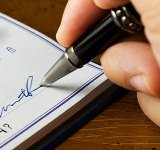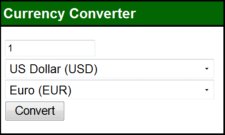Commission Free
Travellers Cheques
Commission free travellers cheques are still a good way of travelling with foreign currency.
I like these, especially when they are commission free. Travellers cheques (or Travelers Checks) are a lot more secure than carrying lots of cash, but they can sometimes be a little difficult to convert. Not so bad if you are in towns or cities, so long as there is a Bureau de Change. However, if you are somewhere off the beaten track, you might have find it harder to convert them.
You can buy them in your own currency, a major global currency (e.g. Dollar, Euro, Pound) or the foreign currency of the place you are visiting.
Commission Free
Buying them commission free, means you don't pay a fee AND the exchange rate spread, you'll just pay for them through the spread.
If you buy them from Amex or Thomas Cook in the currency of the place you're visiting, you'll pay the company's fees through the exchange rate when you get them, but you will get face value in the local currency when you cash them (so long as it is an Amex or Thomas Cook or one of their partner bureaux de change). If you buy them in your own currency, they'll be at face value cash for cheque when you get them, but you'll pay the company through their exchange rate spread when you come to convert.
As always, the advice would be to shop around to find the best deal.
Using them as cheques to pay a shop or hotel
Travellers cheques can sometimes be used for purchases, but you are relying on the exchange rate from the retailer plus any fees they feel like adding. So, I advise you to try to not to use them in this way.

Secure
Prior to prepaid cards, commission free travellers cheques were my preferred way of taking most of my money abroad. They provide some great security – all you need to do is sign them and make a note of the travellers cheque numbers (However, you must remember to keep the list of their numbers separate from the cheques, so that if you lose one you don't lose the other).
When I was backpacking around Europe, it was a safe way to carry my money. I kept them in a money belt under my clothes. When I needed to change them, the guide books I used showed the locations of the local Thomas Cook or American Express branch for changing them commission free. Travellers cheques from Thomas Cook or American Express (Amex) always had a fair and competitive exchange rate. The bank or the post office had the next best rates, also usually commission free.
When I travelled, I took both £ (GB Pound Sterling) and $ (US Dollar) cheques. I found that both were generally accepted, but the $ Dollar ones could be exchanged in more places, so if you were to take a particular global currency, I'd probably recommend $ Dollar ones.
Fees
Although some places don't charge commission or fees, most places will. If you do take travellers cheques, try to take them in larger amounts as it will cost the same fee to cash-in a small amount as it will to cash-in a large amount. The difference in percentage terms is huge. The £2 or £3 fee to cash in £10 pounds worth is 20-30% compared to a 2-3% fee for cashing-in £100 pounds worth.
Exchange Rates
As with foreign currency cash, exchange rates for foreign currency travellers cheques change on a daily basis so you should shop around before converting them.
In summary
Commission free travellers cheques are:
- Safe and secure
- Not the cheapest
- Some places will charge you commission and make money on the exchange rate spread
- Do shop around - check the exchange rates offered by different providers both when buying them and when cashing them into the foreign currency
- Remember to make a copy of their serial numbers and keep this separate from the cheques
Finally,
these days a prepaid money card can be the easiest to use and is the
form I now prefer for buying things when I'm in another country.
However, don't discount the other methods of using foreign currency (like commission free travellers cheques),
they each have their benefits and problems and suit different people in
different circumstances.
Return from the Commission Free Travellers Cheques page to the Buying Foreign Currency page
Return from the Commission Free Travellers Cheques page to the Exchange Rate home page









New! Comments
Have your say about what you just read! Leave me a comment in the box below.